Abstract
The emphysema associated with the inherited serum deficiency of alpha 1-antitrypsin appears to result from an imbalance between neutrophil elastase and its major inhibitor within the alveolar structures. In the present study we assessed the feasibility of reversing this biochemical defect within the lung via parenteral replacement therapy with an alpha 1-antitrypsin concentrate of normal plasma. A 20--40% polyethylene glycol precipitate of pooled human donor plasma was used to obtain an enriched alpha 1-antitrypsin concentrate devoid of hepatitis B antigen and immunoglobulins. Using this material, five individuals with severe serum alpha 1-antitrypsin deficiency (PiZ phenotype) and advanced emphysema received 4 g of alpha 1-antitrypsin intravenously at weekly intervals for four doses. During this period of weekly replacement therapy alpha 1-antitrypsin serum levels were maintained at greater than or equal to 70 mg/dl, the level likely required for effective antielastase protection of the lung. In addition, assessment of lower respiratory tract antielastase activity by bronchoalveolar lavage demonstrated that parenteral replacement of alpha 1-antitrypsin resulted in establishment of effective antielastase activity within the alveolar structures. There were no untoward side effects consequent to this approach to the replacement therapy of alpha 1-antitrypsin. These results demonstrate that the parenteral replacement of alpha 1-antitrypsin provides a means of obtaining elastase-antielastase balance within the lung of individuals with this serum protease inhibitor deficiency.
Full text
PDF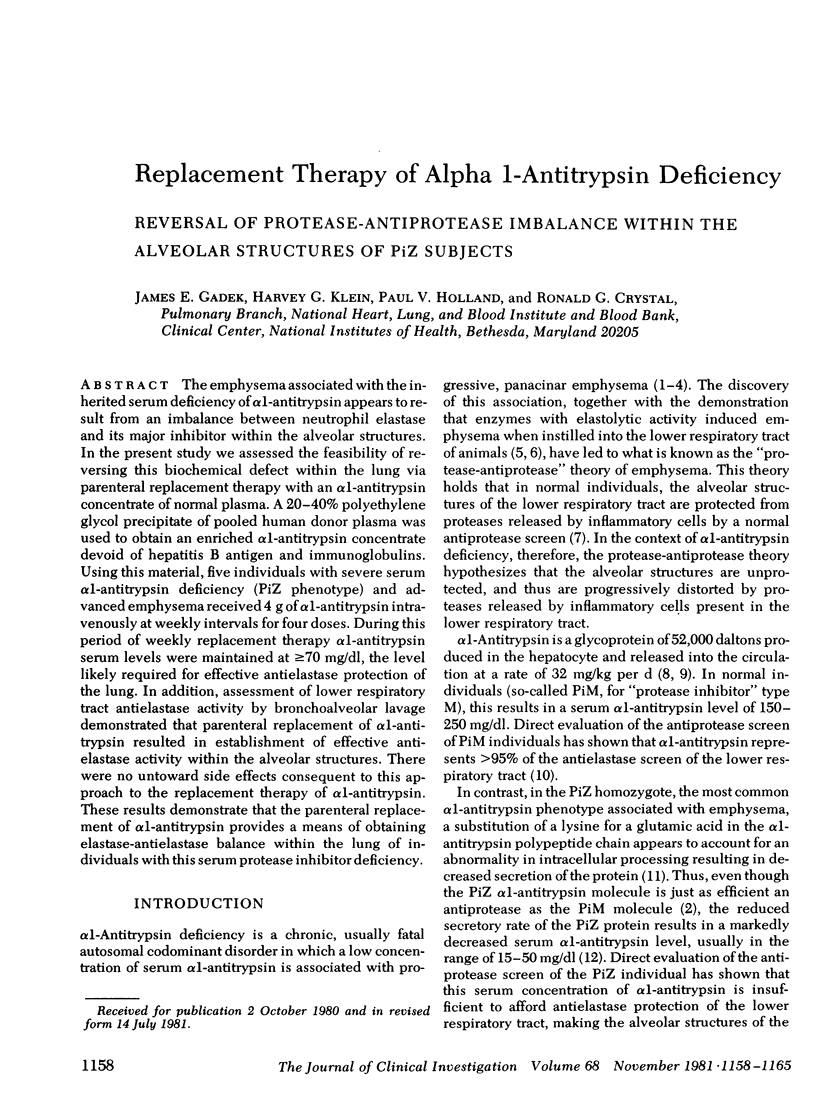
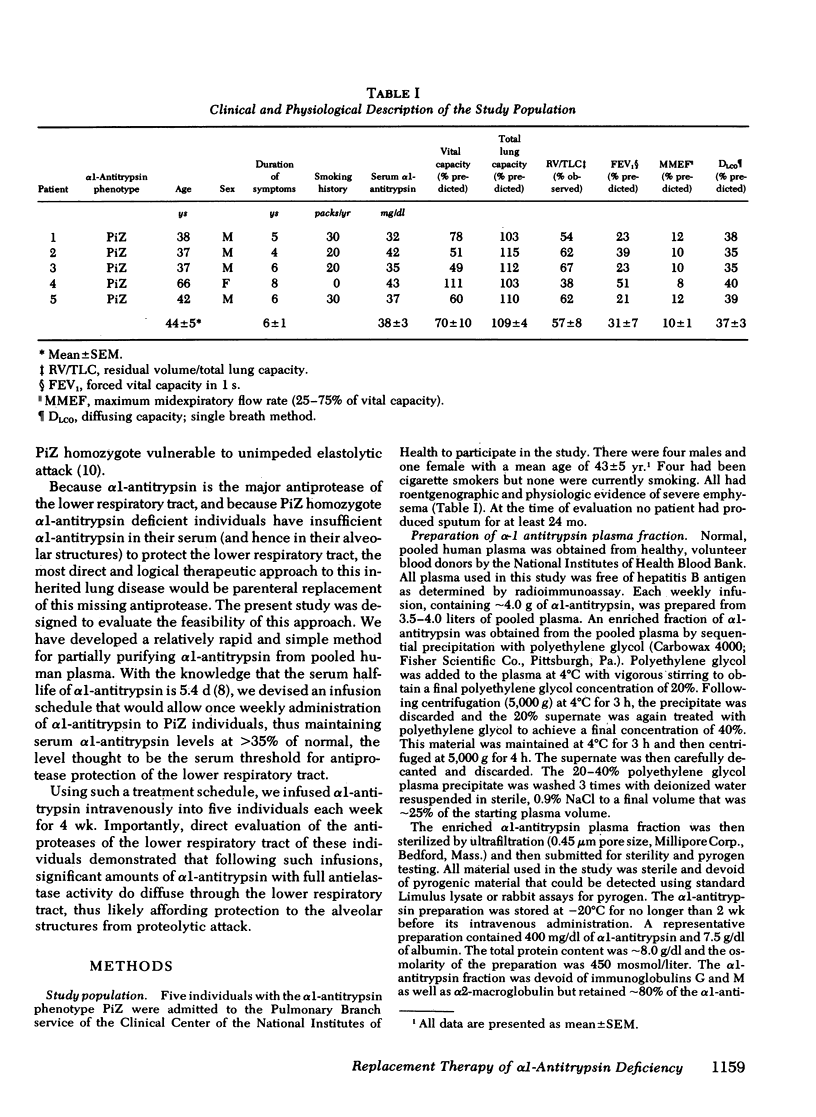
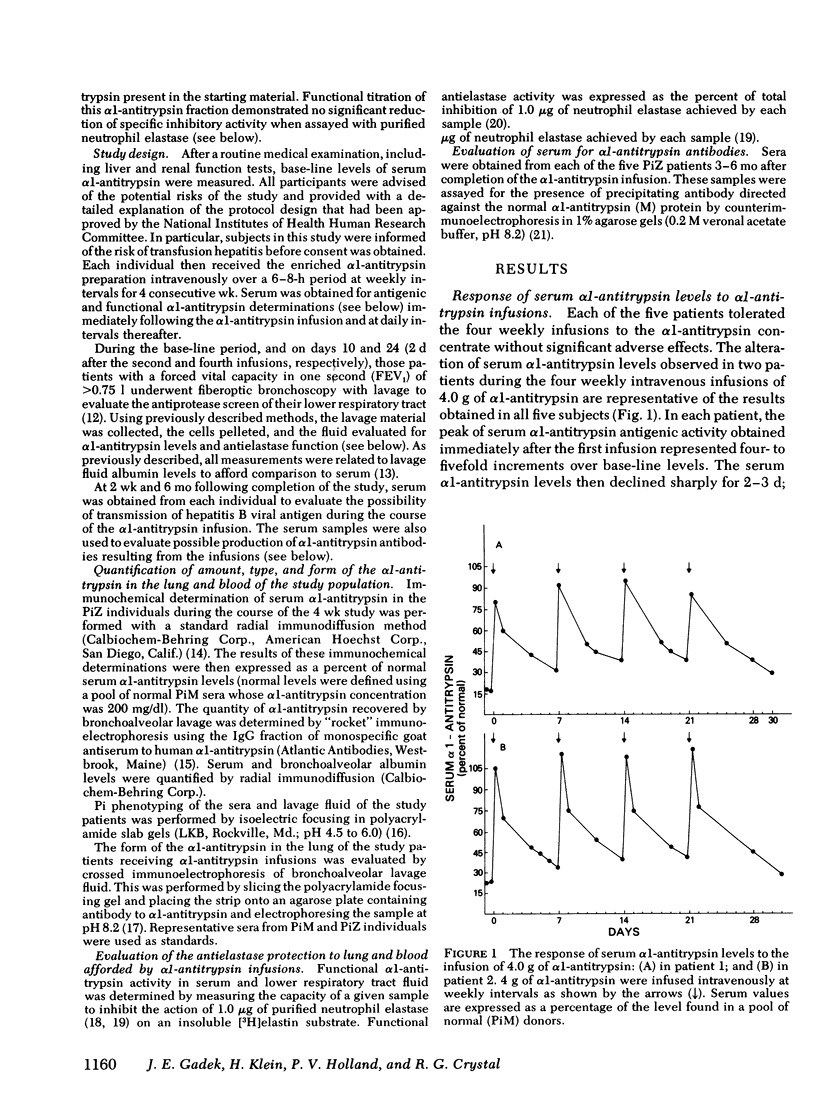
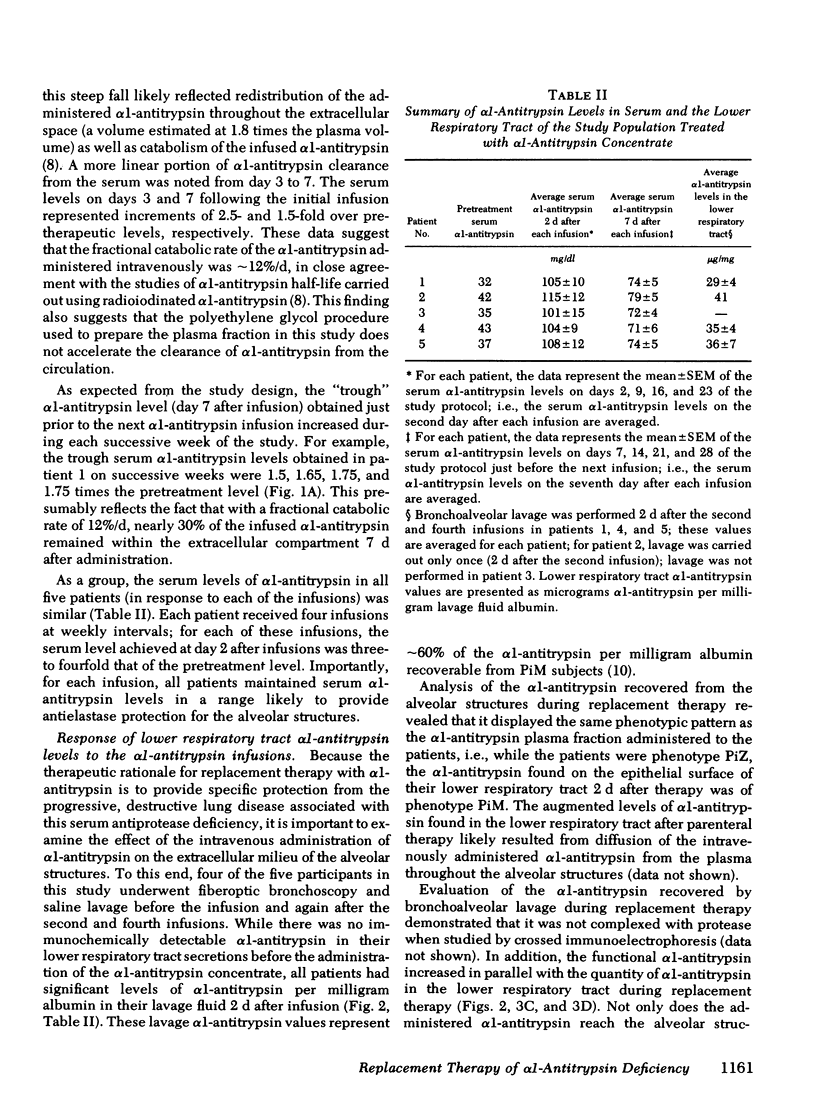
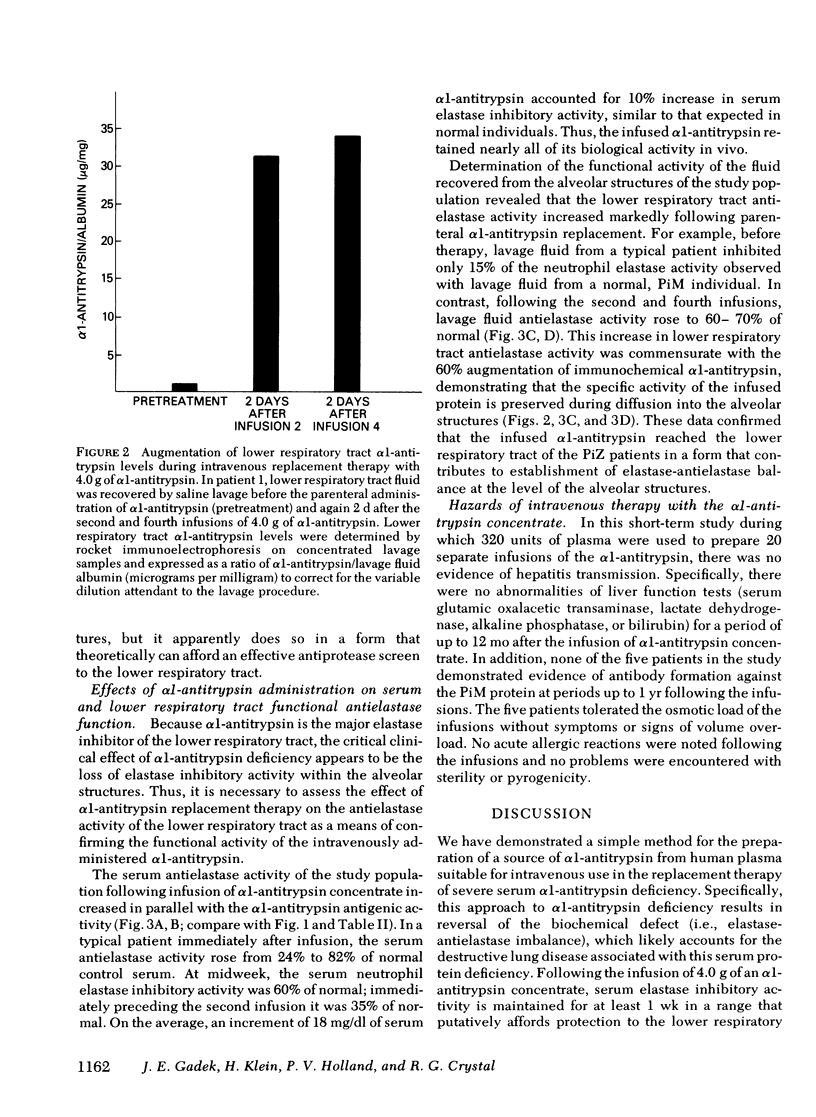
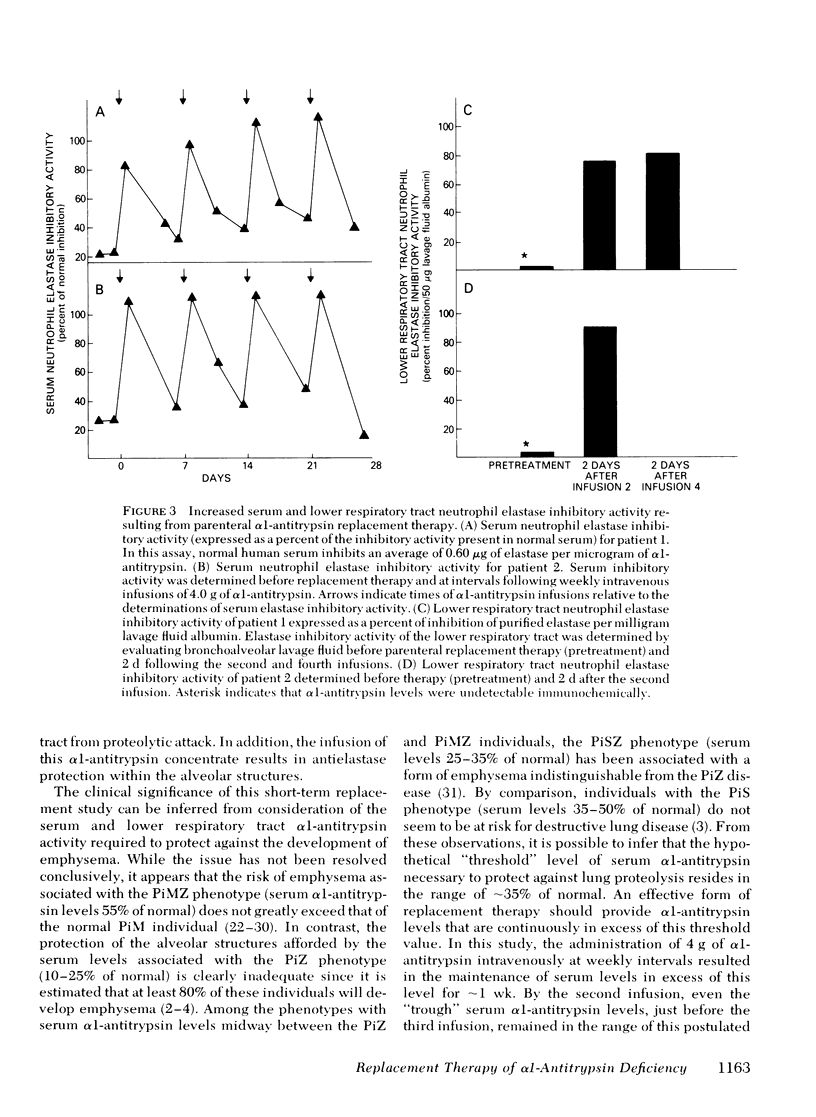
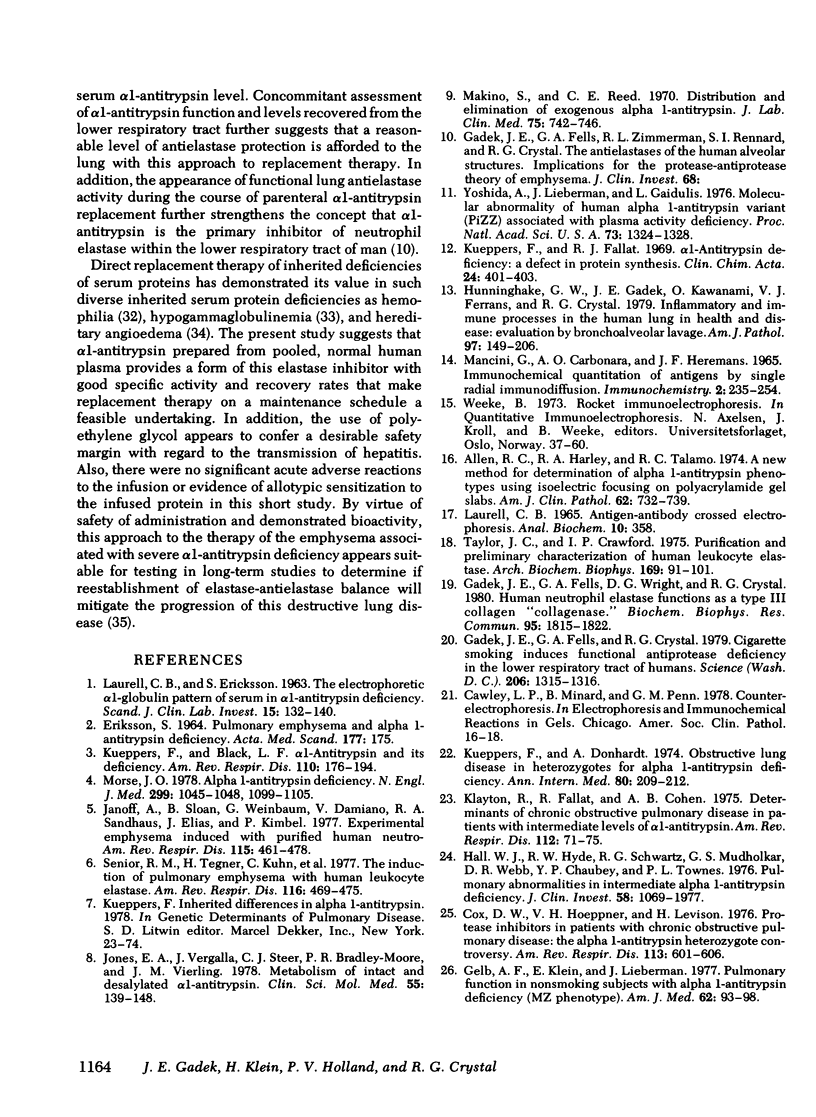
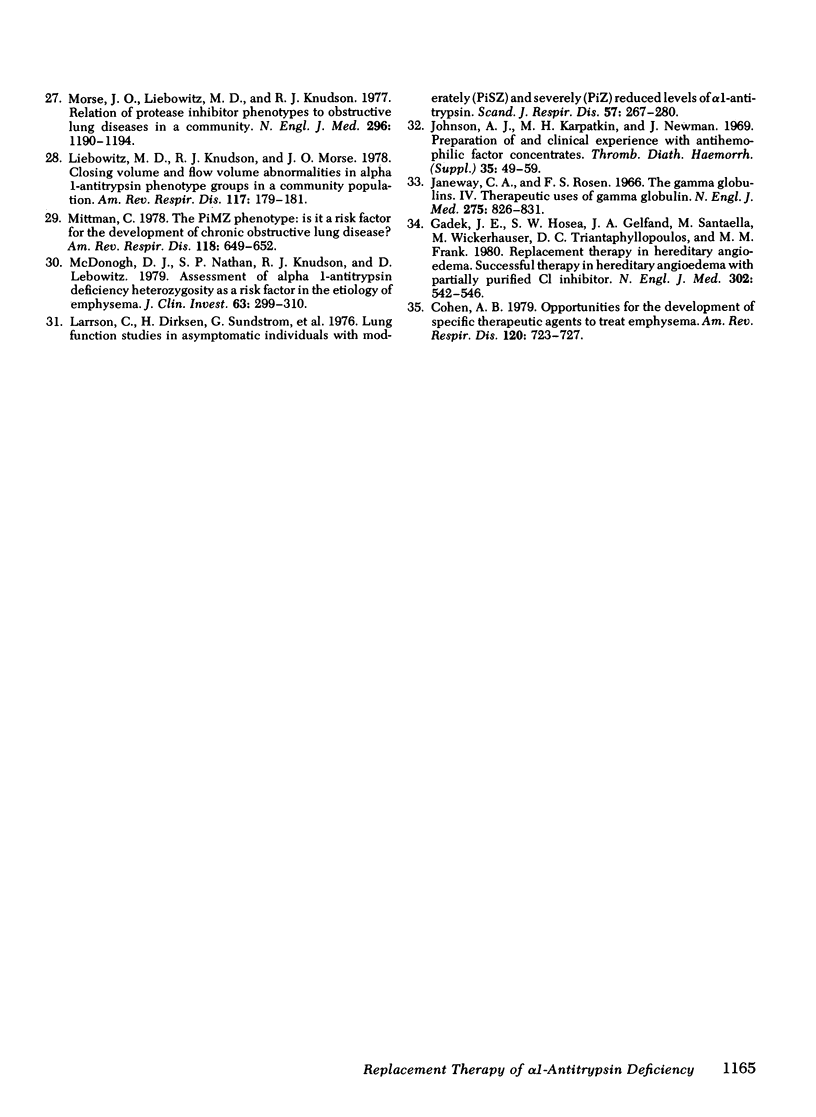
Selected References
These references are in PubMed. This may not be the complete list of references from this article.
- Allen R. C., Harley R. A., Talamo R. C. A new method for determination of alpha-1-antitrypsin phenotypes using isoelectric focusing on polyacrylamide gel slabs. Am J Clin Pathol. 1974 Dec;62(6):732–739. doi: 10.1093/ajcp/62.6.732. [DOI] [PubMed] [Google Scholar]
- Cohen A. B. Opportunities for the development of specific therapeutic agents to treat emphysema. Am Rev Respir Dis. 1979 Oct;120(4):723–727. doi: 10.1164/arrd.1979.120.4.723. [DOI] [PubMed] [Google Scholar]
- Cox D. W., Hoeppner V. H., Levison H. Protease inhibitors in patients with chronic obstructive pulmonary disease: the alpha-antitrypsin heterozygote controversy. Am Rev Respir Dis. 1976 May;113(5):601–606. doi: 10.1164/arrd.1976.113.5.601. [DOI] [PubMed] [Google Scholar]
- Gadek J. E., Fells G. A., Crystal R. G. Cigarette smoking induces functional antiprotease deficiency in the lower respiratory tract of humans. Science. 1979 Dec 14;206(4424):1315–1316. doi: 10.1126/science.316188. [DOI] [PubMed] [Google Scholar]
- Gadek J. E., Fells G. A., Wright D. G., Crystal R. G. Human neutrophil elastase functions as a type III collagen "collagenase". Biochem Biophys Res Commun. 1980 Aug 29;95(4):1815–1822. doi: 10.1016/s0006-291x(80)80110-0. [DOI] [PubMed] [Google Scholar]
- Gadek J. E., Hosea S. W., Gelfand J. A., Santaella M., Wickerhauser M., Triantaphyllopoulos D. C., Frank M. M. Replacement therapy in hereditary angioedema: successful treatment of acute episodes of angioedema with partly purified C1 inhibitor. N Engl J Med. 1980 Mar 6;302(10):542–546. doi: 10.1056/NEJM198003063021002. [DOI] [PubMed] [Google Scholar]
- Gelb A. F., Klein E., Lieberman J. Pulmonary function in nonsmoking subjects with alpha1 antitrypsin deficiency (MZ phenotype). Am J Med. 1977 Jan;62(1):93–98. doi: 10.1016/0002-9343(77)90354-0. [DOI] [PubMed] [Google Scholar]
- Hall W. J., Hyde R. W., Schwartz R. H., Mudholkar G. S., Webb D. R., Chaubey Y. P., Townes P. L. Pulmonary abnormalities in intermediate alpha-1-antitrypsin deficiency. J Clin Invest. 1976 Nov;58(5):1069–1077. doi: 10.1172/JCI108558. [DOI] [PMC free article] [PubMed] [Google Scholar]
- Hunninghake G. W., Gadek J. E., Kawanami O., Ferrans V. J., Crystal R. G. Inflammatory and immune processes in the human lung in health and disease: evaluation by bronchoalveolar lavage. Am J Pathol. 1979 Oct;97(1):149–206. [PMC free article] [PubMed] [Google Scholar]
- Janeway C. A., Rosen F. S. The gamma globulins. IV. Therapeutic uses of gamma globulin. N Engl J Med. 1966 Oct 13;275(15):826–831. doi: 10.1056/NEJM196610132751508. [DOI] [PubMed] [Google Scholar]
- Janoff A., Sloan B., Weinbaum G., Damiano V., Sandhaus R. A., Elias J., Kimbel P. Experimental emphysema induced with purified human neutrophil elastase: tissue localization of the instilled protease. Am Rev Respir Dis. 1977 Mar;115(3):461–478. doi: 10.1164/arrd.1977.115.3.461. [DOI] [PubMed] [Google Scholar]
- Johnson A. J., Karpatkin M. H., Newman J. Preparation of and clinical experience with antihemophilic factor concentrates. Thromb Diath Haemorrh Suppl. 1968;35:49–59. [PubMed] [Google Scholar]
- Jones E. A., Vergalla J., Steer C. J., Bradley-Moore P. R., Vierling J. M. Metabolism of intact and desialylated alpha 1-antitrypsin. Clin Sci Mol Med. 1978 Aug;55(2):139–148. doi: 10.1042/cs0550139. [DOI] [PubMed] [Google Scholar]
- Klayton R., Fallat R., Cohen A. B. Determinants of chronic obstructive pulmonary disease in patients with intermediate levels of alpha-antitrypsin. Am Rev Respir Dis. 1975 Jul;112(1):71–75. doi: 10.1164/arrd.1975.112.1.71. [DOI] [PubMed] [Google Scholar]
- Kueppers F., Black L. F. Alpha1-antitrypsin and its deficiency. Am Rev Respir Dis. 1974 Aug;110(2):176–194. doi: 10.1164/arrd.1974.110.2.176. [DOI] [PubMed] [Google Scholar]
- Kueppers F., Dönhardt A. Obstructive lung disease in heterozygotes for alpha-1 antitrypsin deficiency. Ann Intern Med. 1974 Feb;80(2):209–212. doi: 10.7326/0003-4819-80-2-209. [DOI] [PubMed] [Google Scholar]
- Kueppers F., Fallat R. J. Alpha-1-antitrypsin deficiency: a defect in protein synthesis. Clin Chim Acta. 1969 Jun;24(3):401–403. doi: 10.1016/0009-8981(69)90111-9. [DOI] [PubMed] [Google Scholar]
- LAURELL C. B. ANTIGEN-ANTIBODY CROSSED ELECTROPHORESIS. Anal Biochem. 1965 Feb;10:358–361. doi: 10.1016/0003-2697(65)90278-2. [DOI] [PubMed] [Google Scholar]
- Larsson C., Dirksen H., Sundström G., Eriksson S. Lung function studies in asymptomatic individuals with moderately (Pi SZ) and severely (Pi Z) reduced levels of alpha1-antitrypsin. Scand J Respir Dis. 1976;57(6):267–280. [PubMed] [Google Scholar]
- Lebowitz M. D., Knudson R. J., Morse J. O., Armet D. Closing volume and flow volume abnormalities in alpha(1)-antitrypsin phenotype groups in a community population. Am Rev Respir Dis. 1978 Jan;117(1):179–181. doi: 10.1164/arrd.1978.117.1.179. [DOI] [PubMed] [Google Scholar]
- Makino S., Reed C. E. Distribution and elimination of exogenous alpha1-antitrypsin. J Lab Clin Med. 1970 May;75(5):742–746. [PubMed] [Google Scholar]
- Mancini G., Carbonara A. O., Heremans J. F. Immunochemical quantitation of antigens by single radial immunodiffusion. Immunochemistry. 1965 Sep;2(3):235–254. doi: 10.1016/0019-2791(65)90004-2. [DOI] [PubMed] [Google Scholar]
- McDonagh D. J., Nathan S. P., Knudson R. J., Lebowitz M. D. Assessment of alpha-1-antitrypsin deficiency heterozygosity as a risk factor in the etiology of emphysema. Physiological comparison of adult normal and heterozygous protease inhibitor phenotype subjects from a random population. J Clin Invest. 1979 Feb;63(2):299–309. doi: 10.1172/JCI109303. [DOI] [PMC free article] [PubMed] [Google Scholar]
- Mittman C. The PiMZ phenotype: is it a significant risk factor for the development of chronic obstructive lung disease? Am Rev Respir Dis. 1978 Oct;118(4):649–652. doi: 10.1164/arrd.1978.118.4.649. [DOI] [PubMed] [Google Scholar]
- Morse J. O., Lebowitz M. D., Knudson R. J., Burrows B. Relation of protease inhibitor phenotypes to obstructive lung diseases in a community. N Engl J Med. 1977 May 26;296(21):1190–1194. doi: 10.1056/NEJM197705262962102. [DOI] [PubMed] [Google Scholar]
- Morse J. O. alpha1-antitrypsin deficiency (first of two parts). N Engl J Med. 1978 Nov 9;299(19):1045–1048. doi: 10.1056/NEJM197811092991905. [DOI] [PubMed] [Google Scholar]
- Senior R. M., Tegner H., Kuhn C., Ohlsson K., Starcher B. C., Pierce J. A. The induction of pulmonary emphysema with human leukocyte elastase. Am Rev Respir Dis. 1977 Sep;116(3):469–475. doi: 10.1164/arrd.1977.116.3.469. [DOI] [PubMed] [Google Scholar]
- Taylor J. C., Crawford I. P. Purification and preliminary characterization of human leukocyte elastasel. Arch Biochem Biophys. 1975 Jul;169(1):91–101. doi: 10.1016/0003-9861(75)90320-3. [DOI] [PubMed] [Google Scholar]
- Yoshida A., Lieberman J., Gaidulis L., Ewing C. Molecular abnormality of human alpha1-antitrypsin variant (Pi-ZZ) associated with plasma activity deficiency. Proc Natl Acad Sci U S A. 1976 Apr;73(4):1324–1328. doi: 10.1073/pnas.73.4.1324. [DOI] [PMC free article] [PubMed] [Google Scholar]


